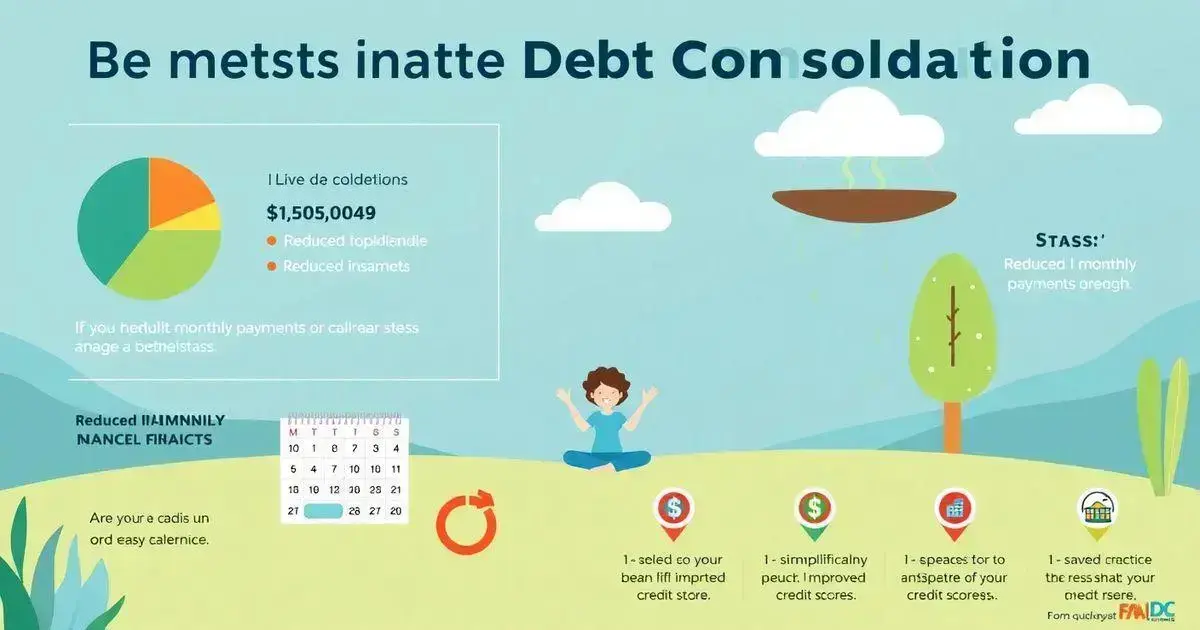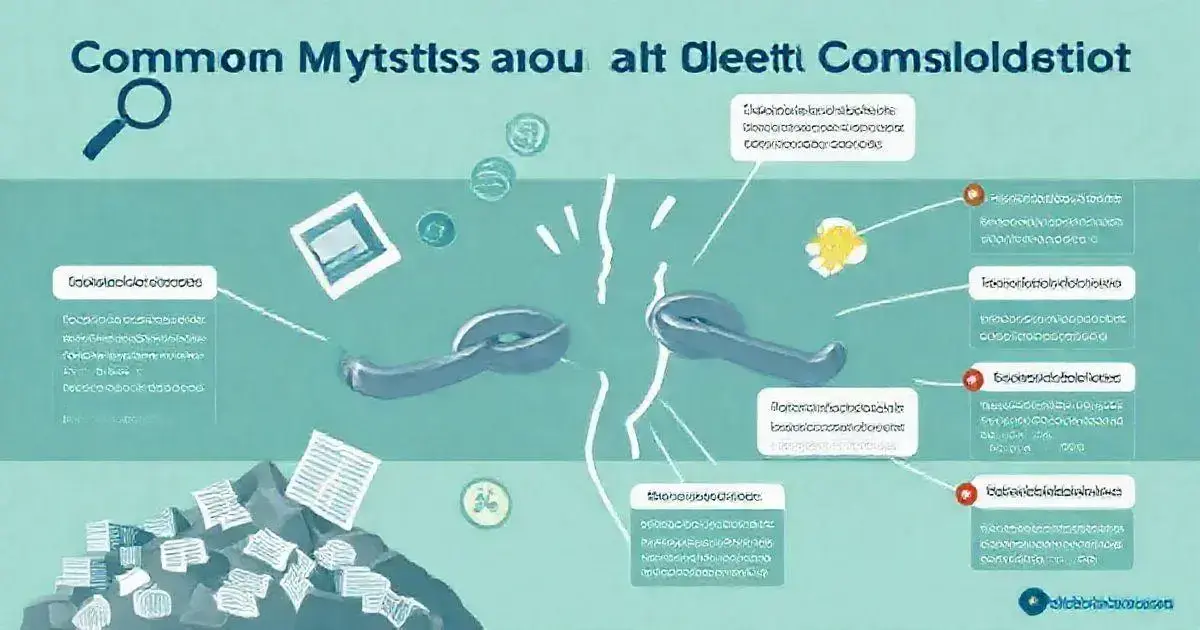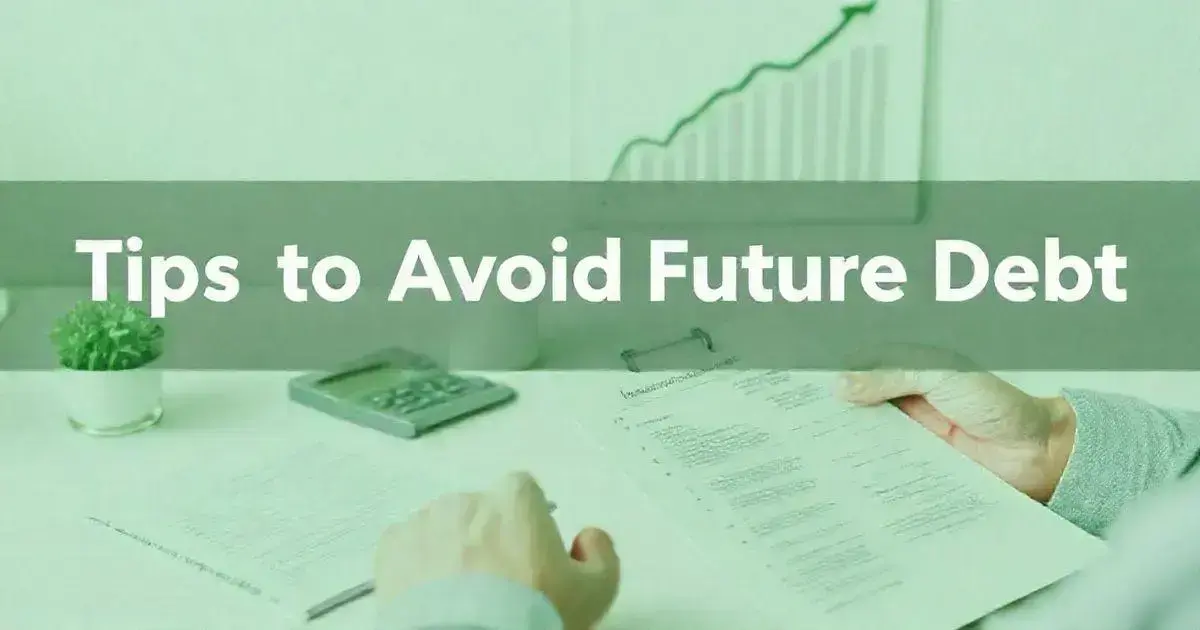Debt consolidation tips can help simplify your finances by combining multiple debts into one payment. This approach often lowers interest rates, making monthly payments more manageable. With the right strategy, it’s easier to stay on top of your finances and reduce debt faster.
Choosing the best consolidation method is key to success. Whether it’s a personal loan, balance transfer, or home equity loan, each option offers unique benefits depending on your situation.
Curious about how to make debt consolidation work for you? Keep reading to learn more!
Benefits of Debt Consolidation

Debt consolidation has several benefits that can improve your financial situation. One significant advantage is lower monthly payments. By combining multiple debts into a single loan, you may secure a lower interest rate, thus decreasing the amount you pay each month. This relief can free up cash for other essential expenses or savings.
Debt consolidation tips can help you navigate the process and make sure you’re getting the most out of it. Another benefit is simplified payment processes. Managing one monthly payment is less stressful than juggling multiple due dates and amounts. This simplification can lead to fewer missed payments, which can negatively impact your credit score.
Additionally, debt consolidation can potentially improve your credit score over time. As you pay down the consolidated loan, your credit utilization ratio improves, especially if you reduce your overall debt amount. Keeping your payment history positive through timely payments further strengthens your credit profile.
Finally, debt consolidation tips can help you stay focused and on track as you work to improve your financial health. Consolidating debt can provide emotional burden relief.
Reducing the number of creditors you deal with can decrease stress and anxiety related to debt. Knowing that you are on a structured repayment plan offers peace of mind and encourages healthy financial habits moving forward.
Choosing the Right Consolidation Method
Choosing the right consolidation method is essential for effectively managing your debt. There are various options available, each suited for different financial situations.
One common method is a personal loan, which combines multiple debts into a single loan with a set interest rate and payment plan. This method can lead to lower monthly payments compared to your current debts.
Debt consolidation tips often recommend using a balance transfer credit card that offers a low or 0% introductory APR. This allows you to transfer existing debts and pay them off without accruing interest for a limited time.
Additionally, home equity loans use your home’s value as collateral, which can also yield lower interest rates. However, it’s important to understand that using your home as collateral involves risks, including potential loss of your home.
Lastly, there are debt management programs offered by nonprofit credit counseling agencies, which can help negotiate better terms and lower interest rates with your creditors.
Debt consolidation tips suggest weighing these methods carefully. Each option has its pros and cons, so it’s crucial to consider the best approach for your financial future.
Common Myths about Debt Consolidation

There are many common myths about debt consolidation that can lead to confusion. One prevalent myth is that debt consolidation eliminates your debt. In reality, it does not erase the debt; it simply changes its form, often making it easier to manage.
Another myth suggests that debt consolidation will have a negative impact on your credit score. While applying for new credit can cause a temporary dip, responsible management of a consolidated loan can actually improve your credit over time. Debt consolidation tips often debunk this myth by highlighting how timely payments can enhance your credit over time.
Additionally, many believe that debt consolidation is only for people with bad credit. However, this option is available for anyone who wants to streamline their loans or reduce interest rates, regardless of credit history.
Finally, many people assume that all debt consolidation methods are the same. However, options like personal loans, balance transfers, and home equity loans all have different terms and conditions.
Debt consolidation tips suggest understanding these differences to make an informed decision when considering debt consolidation and ensure that you choose the best path to financial stability.
How to Create a Debt Repayment Plan
Creating a debt repayment plan is an important step toward financial freedom. Begin by listing all your debts, including the amount owed, interest rates, and minimum monthly payments. This comprehensive overview helps you understand where you stand financially.
Next, prioritize your debts using the avalanche or snowball method. The avalanche method focuses on paying off high-interest debts first, which saves you money in the long run. On the other hand, the snowball method encourages you to pay off smaller debts first for quick wins and motivation.
Debt consolidation tips can also help you streamline your payments by combining multiple debts into one loan with a lower interest rate, making it easier to manage your finances.
Once you decide on a strategy, create a realistic monthly budget. Cut unnecessary expenses to free up funds for your debt payments. Set specific financial goals for yourself, such as paying off a certain debt within a year.
Consistency is crucial; make sure to stick to your plan and review it regularly. If your financial situation changes, feel free to adjust your plan as needed.
Lastly, celebrate your milestones, no matter how small. Rewarding yourself will keep you motivated on your journey to becoming debt-free.
Finding the Best Lenders for Consolidation

Finding the best lenders for consolidation is essential for reducing your debt effectively. Start by comparing interest rates from various lenders.
Look for lenders that offer fixed rates as they provide stable payments over time. Additionally, consider the fees associated with borrowing, such as origination or application fees, as these can add to your overall cost.
Debt consolidation tips recommend checking the lender’s reputation; read reviews or ratings from past customers to ensure they are trustworthy.
Many lenders provide personal loans specifically for debt consolidation, so seek those that specialize in this area. Look into credit unions or local banks as they often have lower rates than larger institutions.
Furthermore, check if the lender has flexible repayment options. This feature can help if you face difficulties in your financial situation later on.
Lastly, always read the loan terms carefully before making a decision, and do not hesitate to ask questions to clarify any uncertainties.
Impact of Debt Consolidation on Credit Score
The impact of debt consolidation on your credit score can be significant. When you consolidate debt, you pay off existing debts, which can lead to a decrease in your overall credit utilization ratio. A lower credit utilization ratio generally improves your credit score.
Debt consolidation tips recommend noting that applying for a new consolidation loan can result in a hard inquiry on your credit report. This might temporarily lower your score. Once you consolidate and start making consistent, on-time payments, you can see gradual improvement in your score over time.
Additionally, managing your new consolidated loan effectively shows lenders that you are reliable, which can further enhance your credit profile. Remember, maintaining a good credit score also involves avoiding new debts while paying off your consolidated loan. This disciplined approach can lay the groundwork for a better financial future.
Tips to Avoid Future Debt

To avoid future debt, start by creating a strong budget. Track your income and expenses to understand your spending habits.
Debt consolidation tips emphasize the importance of setting realistic spending limits for each category, and sticking to them.
Additionally, build a strong emergency fund to cover unexpected expenses. This reserve can prevent you from relying on credit cards or loans during emergencies.
Another important tip is to avoid impulse purchases. Take time to think about whether you really need an item before buying it. Consider using the ’24-hour rule’; wait a day before making non-essential purchases.
Furthermore, regularly review your financial goals and prioritize saving. Focus on saving for future needs like vacations, education, or retirement instead of accumulating debt.
Lastly, consider talking to a financial advisor if you’re unsure about managing your finances. They can provide guidance tailored to your unique situation.
FAQ – Frequently Asked Questions about Debt Consolidation
What is debt consolidation?
Debt consolidation is the process of combining multiple debts into a single payment, often with a lower interest rate.
How can debt consolidation help me?
It can simplify your payments and potentially lower your monthly bills, making it easier to manage your finances.
What types of debt can be consolidated?
You can consolidate various types of debt including credit card bills, personal loans, and medical expenses.
Will debt consolidation affect my credit score?
It may initially lower your credit score due to a hard inquiry, but responsible management can improve it over time.
How do I choose the best debt consolidation method?
Consider your total debt, interest rates, and financial situation. Popular options include personal loans and balance transfer credit cards.
Are there any risks involved with debt consolidation?
If not managed properly, it can lead to accumulating more debt. It’s essential to avoid taking on new debts after consolidation.
Can I consolidate my student loans?
Yes, federal and private student loans can be consolidated, often through specific programs designed for this purpose.
What is the difference between secured and unsecured debt consolidation?
Secured consolidation uses an asset as collateral, while unsecured consolidation does not. Secured options may have lower interest rates.